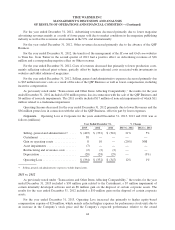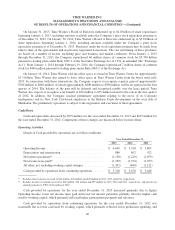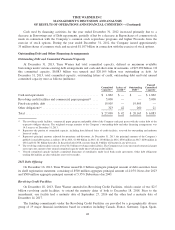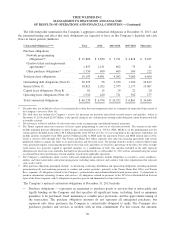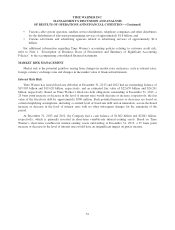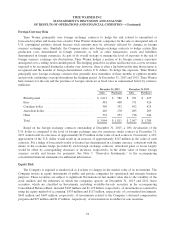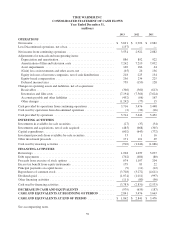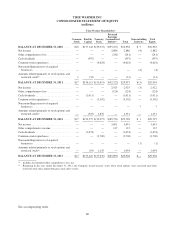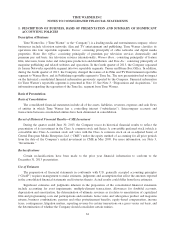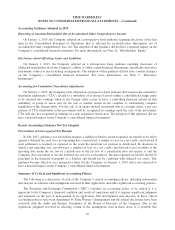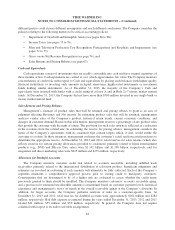Time Magazine 2013 Annual Report Download - page 70
Download and view the complete annual report
Please find page 70 of the 2013 Time Magazine annual report below. You can navigate through the pages in the report by either clicking on the pages listed below, or by using the keyword search tool below to find specific information within the annual report.TIME WARNER INC.
MANAGEMENT’S DISCUSSION AND ANALYSIS
OF RESULTS OF OPERATIONS AND FINANCIAL CONDITION – (Continued)
The potential loss in fair value resulting from a 10% adverse change in the prices of the Company’s equity-
method investments, cost-method investments and available-for-sale securities would be approximately $140
million. The potential loss in fair value resulting from a 10% adverse change in the prices of certain of the
Company’s deferred compensation investments accounted for as trading securities would be approximately $25
million. While Time Warner has recognized all declines that are believed to be other-than-temporary, it is
reasonably possible that individual investments in the Company’s portfolio may experience an other-than-
temporary decline in value in the future if the underlying investee company experiences poor operating results or
the U.S. or certain foreign equity markets experience declines in value.
CRITICAL ACCOUNTING POLICIES
The Company’s consolidated financial statements are prepared in accordance with U.S. GAAP, which
requires management to make estimates, judgments and assumptions that affect the amounts reported in the
consolidated financial statements and accompanying notes. Management considers an accounting policy to be
critical if it is important to the Company’s financial condition and results of operations and if it requires
significant judgment and estimates on the part of management in its application. The development and selection
of these critical accounting policies have been determined by the management of Time Warner, and the related
disclosures have been reviewed with the Audit and Finance Committee of the Board of Directors of the
Company. The Company considers policies relating to the following matters to be critical accounting policies:
• Impairment of Goodwill and Intangible Assets;
• Income Taxes;
• Film and Television Production Cost Recognition, Participations and Residuals and Impairments;
• Gross versus Net Revenue Recognition; and
• Sales Returns and Pricing Rebates.
For a discussion of each of the Company’s critical accounting policies, including information and analysis of
estimates and assumptions involved in their application, and other significant accounting policies, see Note 1,
“Description of Business, Basis of Presentation and Summary of Significant Accounting Policies,” to the
accompanying consolidated financial statements.
CAUTION CONCERNING FORWARD-LOOKING STATEMENTS
This 2013 Annual Report to Shareholders contains “forward-looking statements” within the meaning of the
Private Securities Litigation Reform Act of 1995. These statements can be identified by the fact that they do not
relate strictly to historical or current facts. Forward-looking statements often include words such as “anticipates,”
“estimates,” “expects,” “projects,” “intends,” “plans,” “believes” and words and terms of similar substance in
connection with discussions of future operating or financial performance. Examples of forward-looking
statements in this 2013 Annual Report to Shareholders include, but are not limited to, statements regarding (i) the
adequacy of the Company’s liquidity to meet its needs for the foreseeable future, (ii) the Time Separation,
(iii) the Company’s anticipated contributions to international defined benefit pension plans in 2014, (iv) the
pretax gain and tax benefit expected to be recognized in the first quarter of 2014 in connection with the sale of
the Company’s office space in Time Warner Center, (v) the Company’s expectation that the soft market
conditions that have adversely affected the Time Inc. segment’s Subscription and Advertising revenues will
continue, (vi) charges expected to be incurred by the Time Inc. segment in the first half of 2014 in connection
with a significant restructuring, primarily consisting of headcount reductions, and (vii) the expected closing of
the Eyeworks transaction.
The Company’s forward-looking statements are based on management’s current expectations and
assumptions regarding the Company’s business and performance, the economy and other future conditions and
forecasts of future events, circumstances and results. As with any projection or forecast, forward-looking
statements are inherently susceptible to uncertainty and changes in circumstances. The Company’s actual results
54


